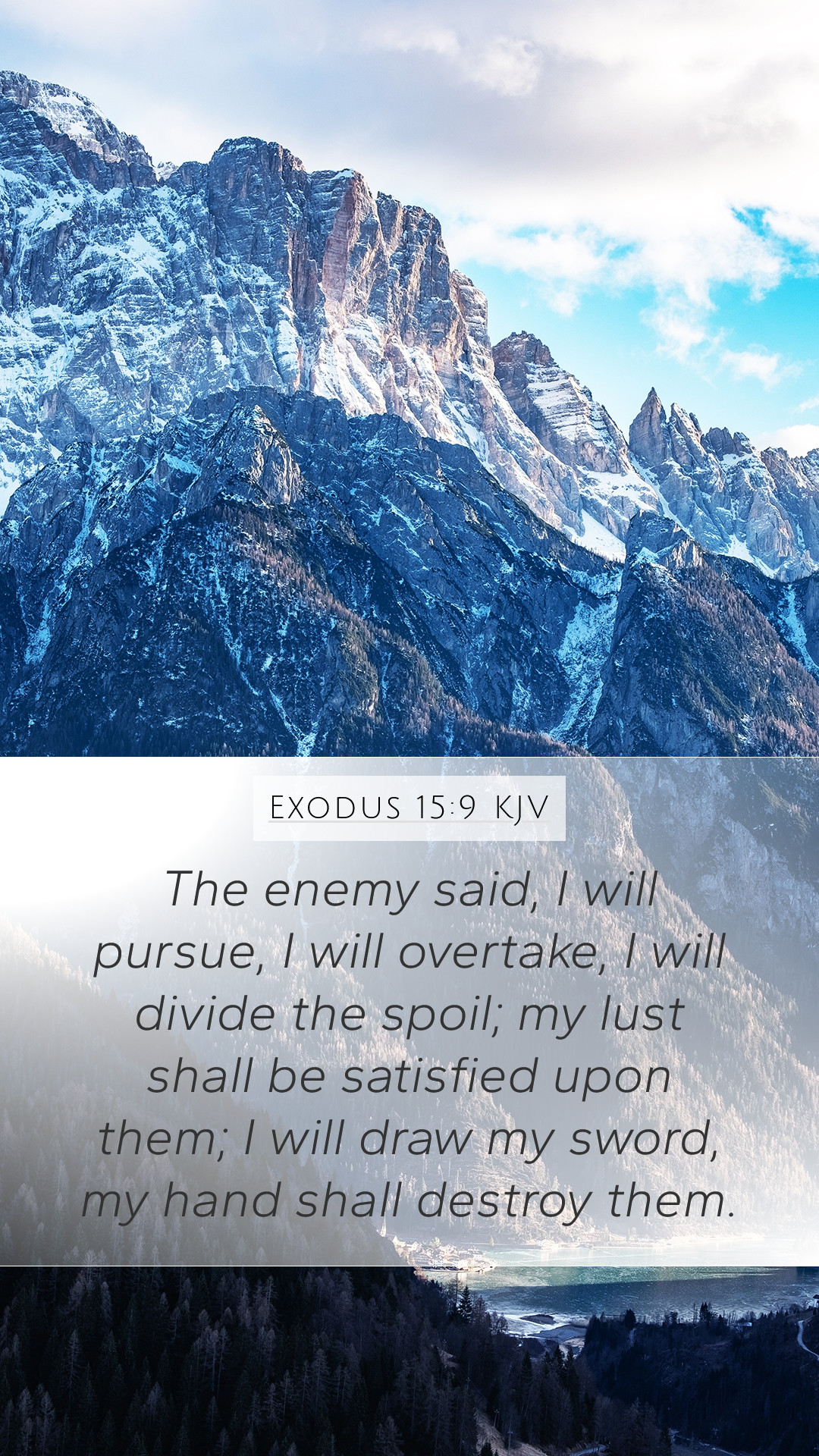Exodus 15:9 - Biblical Commentary and Explanation
The verse Exodus 15:9 states:
"The enemy said, I will pursue, I will overtake, I will divide the spoil; my desire shall be satisfied upon them; I will draw my sword, my hand shall destroy them."
Overview of Exodus 15:9
This verse is part of the Song of Moses, a celebratory hymn sung after the miraculous crossing of the Red Sea. It captures the attitude of the Egyptian army, reflecting their intent and desires as they pursued the Israelites. The verse is instrumental in depicting the conflict between the Israelites and their oppressors, showcased through vivid imagery.
Commentary Insights
-
Matthew Henry's Commentary:
Henry emphasizes that this verse illustrates the pride and confidence of the Egyptians. They believed they could easily reclaim control over the Israelites, unaware of the divine intervention that would thwart their plans. Henry notes that their pursuit and intent signify the larger spiritual battle against God’s people, highlighting the futility of opposing God’s will.
-
Albert Barnes' Notes:
Barnes discusses the motivations behind Pharaoh's army as they pursued Israel. Their declaration, "I will divide the spoil," indicates greed and ambition characteristic of human nature when it comes to oppressing others. Barnes also stresses that the enemy's confidence was based on a misunderstanding of God's power, leading to their ultimate downfall.
-
Adam Clarke’s Commentary:
Clarke points out the psychological aspect of this verse, indicating that it reflects the arrogance and relentless pursuit of the Egyptians as they sought revenge and wealth from their defeated enemies. He underscores that the language used here shows a complete underestimation of God's ability to protect His people.
Thematic Analysis
Exodus 15:9 serves multiple interpretative themes relevant to various audiences:
- God’s Sovereignty: The verse demonstrates that despite human plans and ambitions, God’s power is ultimately supreme.
- Human Pride: The pursuit of the Egyptians reflects human pride and the folly of thinking one can oppose God and succeed.
- Spiritual Warfare: This passage can be interpreted as a metaphor for spiritual struggles faced by believers, illustrating the enmity that arises from attempting to disconnect from God’s protection.
Historical Context
The historical backdrop of this verse is crucial for understanding. After years of slavery, the Israelites were delivered through Moses, signifying a new beginning. The Egyptians, represented by Pharaoh, symbolize oppression and the resistance against God's people. This verse implies a moment of desperation for Pharaoh’s army, which had previously relied on their might and tyranny, now leading them towards destruction.
Cross-References
Exodus 15:9 can be cross-referenced with:
- Exodus 14:13-14: God's assurance of protection to Moses.
- Psalms 124:1-8: A song reflecting on Israel's deliverance.
- Isaiah 43:16-17: God's promise of deliverance and destruction of enemies.
Practical Applications
For today's readers, Exodus 15:9 serves as a reminder of the battles we face in life, whether spiritual or personal. Understanding the historical and spiritual dynamics can equip believers in their faith journey:
- Trust in Divine Protection: Like the Israelites, faith in God’s capabilities gives hope during trials.
- Avoiding Arrogance: Recognizing the folly of human pride can lead to humility and dependence on God.
- Celebrating Deliverance: Acknowledging personal victories over struggles furthers spiritual growth.
Conclusion
Exodus 15:9 encapsulates a powerful moment in biblical history that resonates with timeless themes of struggle, divine intervention, and the ultimate victory of faith. Its implications for understanding God’s sovereignty and the nature of human ambition remain relevant for Bible study groups and individuals seeking deeper insights into Scripture.
In your study of Scripture, consider how such verses can be viewed in the light of God’s overall plan for humanity. Harnessing resources from Bible study guides and online Bible study can enhance your exploration into the meanings of Bible verses.


